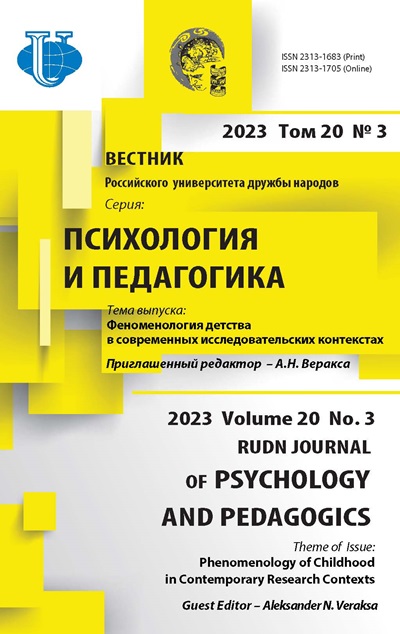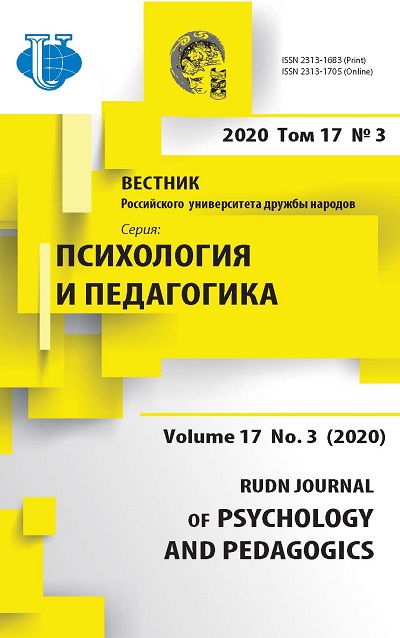Executive Functions and Their Relationship with the Development of Russian Speech in Bilingual and Monolingual Children
- Authors: Khotinets V.Y.1, Salnova S.A.1
-
Affiliations:
- Udmurt State University
- Issue: Vol 17, No 3 (2020)
- Pages: 412-425
- Section: EDUCATION IN RUSSIA AND IN THE WORLD IN THE CONTEXT OF GLOBALISATION AND DIGITALISATION
- URL: https://journals.rudn.ru/psychology-pedagogics/article/view/24711
- DOI: https://doi.org/10.22363/2313-1683-2020-17-3-412-425
Cite item
Full Text
Abstract
The article discusses the results of a study of the relationship between executive functions (inhibitory control, cognitive flexibility, working (speech and visual) memory and the development of Russian speech in children with natural bilingualism and monolinguals in older preschool age. The study involved 63 preschool children (50.8% - boys) aged from 5.6 to 7.3 years (M = 6.42, Med = 6.4) from preschool institutions of Izhevsk (Udmurt Republic). The sample included 31 children with natural bilingualism (Udmurt/Russian language) and 32 monolinguals (Russian language). Standardised methods in the Russian-language version were used to identify the executive functions: the method of verbal-colour interference of by J. Stroop (inhibitory control), the method of studying the learning ability by A.Y. Ivanova (cognitive flexibility) and the test tasks “Speech Memory” and “Visual Memory” (working memory). The level of speech development was measured using the test tasks “Speech Antonyms”, “Speech Classifications” and “Arbitrary Mastery of Speech” developed by L.А. Yasyukova. The following mathematical statistics methods were used: descriptive statistics, Mann - Whitney U-test and Spearman rank correlations. According to the results of the study, the facts of the advantages of bilingualism in older preschool age in executive functions, in particular, in inhibitory control cognitive flexibility and speech memory were confirmed. At the same time, no general patterns were determined in the development of Russian speech (L2) in connection with the development of the executive functions of bilingual children: this is explained by the individualisation of the processes of linking the components of speech activity in the second language and cognitive control. In monolingual preschoolers, the speech development in their native language (L1) is associated with the formation of higher mental (executive) functions and the development of the ability to control information processing.
About the authors
Vera Yu. Khotinets
Udmurt State University
Author for correspondence.
Email: khotinets@mail.ru
D.Sc. in Psychology, Full Professor, is Head of General Psychology Department
1 Universitetskaya St, Izhevsk, 426034, Russian FederationSofya A. Salnova
Udmurt State University
Email: sofyasalnova@yandex.ru
graduate student of General Psychology Department
1 Universitetskaya St, Izhevsk, 426034, Russian FederationReferences
- Abramova, G.S. (1999). Praktikum po vozrastnoj psihologii. Moscow: Akademiya Publ. (In Russ.)
- Almazova, O.V., Buhalenkova, D.A., & Veraksa, A.N. (2019). Assessment of the level of development of executive functions in the senior preschool age. Psychology. Journal of the Higher School of Economics, 16(2), 94–109. http://doi.org/10.17323/1813-8918-2019-2-302-317 (In Russ.)
- Almazova, O.V., Buhalenkova, D.A., Gavrilova, M.N., & Tarasova, K.C. (2018). Lexical indicators of speech development in preschool children with different levels of self-regulation. Preschool Education Today, 8(90), 54–61. http://doi.org/10.24411/1997-9657-2018-10035 (In Russ.)
- Ardila, A. (2012). Advantages and disadvantages of bilingualism. Forma Function, 25(2), 99–114.
- Best, J.R., Miller, P.H., & Jones, L.L. (2009). Executive functions after age 5: Changes and correlates. Developmental Review, 29(3), 180–200. http://doi.org/10.1016/j.dr.2009.05.002
- Bialystok, E. (2017). The bilingual adaptation: How minds accommodate experience. Psychological Bulletin, 143(3), 233–262. http://doi.org/10.1037/bul0000099
- Bialystok, E., & Craik, F.I.M. (2010). Cognitive and linguistic processing in
- the bilingual mind. Current Directions in Psychological Science, 19(1), 19–23. http://doi.org/10.1177/0963721409358571
- Bialystok, E., Craik, F.I.M., & Luk, G. (2008). Cognitive control and lexical access in younger and older bilinguals. Journal of Experimental Psychology: Learning Memory and Cognition, 34(4), 859–873. http://doi.org/10.1037/0278-7393.34.4.859
- Bialystok, E., Craik, F.I.M., Klein, R., & Viswanathan, M. (2004). Bilingualism, aging, and cognitive control: Evidence from the Simon task. Psychology and Aging, 19(2), 290–303. http://doi.org/10.1037/0882-7974.19.2.290
- Bialystok, E., Poarch, G., Luo, L., & Craik, F.I.M. (2014). Effects of bilingualism and aging on executive function and working memory. Psychology and Aging, 29(3), 696–705. https://doi.org/10.1037/a0037254
- Costa, A., Hernández, M., Costa-Faidella, J., & Sebastián-Gallés, N. (2009). On the bilingual advantage in conflict processing: Now you see it, now you don’t. Cognition, 113(2), 135–149. https://doi.org/10.1016/j.cognition.2009.08.001
- Dick, A.S., Garcia, N.L., Pruden, S.M., et al. (2019). No evidence for a bilingual executive function advantage in the ABCD study. Nature Human Behaviour, 3(7), 692–701. http://doi.org/10.1038/s41562-019-0609-3
- Emmorey, K., Luk, G., Pyers, J., & Bialystok, E. (2008). The source of enhanced cognitive control in bilinguals: Evidence from bimodal bilinguals. Psychological Science, 19(12), 1201–1206. https://doi.org/10.1111/j.1467-9280.2008.02224.x
- Fernandes, M.A., Craik, F.I.M., Bialystok, E., & Kreuger, S. (2007). Effects of bilingualism, aging, and semantic relatedness on memory under divided attention. Canadian Journal of Experimental Psychology, 61(2), 128–141. https://doi.org/10.1037/cjep2007014
- Fernández-López, M., & Perea, M. (2019). The bilingualism wars: Is the bilingual advantage out of (executive) control? Psicológica, 40(1), 26–33. https://doi.org/10.2478/psicolj-2019-0002
- Haft, S.L., Kepinska, O., Caballero, J.N., Carreiras, M., & Hoeft, F. (2019). Attentional fluctuations, cognitive flexibility, and bilingualism in kindergarteners. Behavioural Sciences, 9(5), 1–15. http://doi.org/10.3390/bs9050058
- Holodnaya, M.A. (2004). Kognitivnye Stili: O Prirode Individual'nogo Uma. Saint Petersburg: Piter Publ. (In Russ.)
- Just, M.A., & Carpenter, P.A. (1992). A capacity theory of comprehension: Individual differences in working memory. Psychological Review, 99(1), 122–149. https://doi.org/10.1037/0033-295x.99.1.122
- Luo, D., Kwok, V.P.Y., Liu, Q., Li, W., Yang, Y., Zhou, K., Xu, M., Gaof, J-H., & Tan, L.H. (2019). Microstructural plasticity in the bilingual brain. Brain and Language, 196, 104654. https://doi.org/10.1016/j.bandl.2019.104654
- Lynn, R. (1999). Sex differences in intelligence and brain size: A developmental theory. Intelligence, 27(1), 1–12. https://doi.org/10.1016/S0160-2896(99)00009-4
- Medvedeva, D.S. (2019). Razvitie Rechemyslitel'noj Deyatel'nosti Mladshih Shkol'nikov-Bilingvov Sredstvami Kul'turnogo Diskursa. Ph.D. in Psychology Thesis. Izhevsk. (In Russ.)
- Medvedeva, D.S., & Khotines, V.Yu. (2018). Features of the verbal and mental activity of bilingual kids. Bulletin of Udmurt University. Series: Philosophy. Psychology. Pedagogy, 28(1), 87–93. (In Russ.)
- Medvedeva, D.S., & Khotines, V.Yu. (2018). Razvitie rechemyslitel'noi deyatel'nosti mladshikh shkol'nikov-bilingvov sredstvami kul'turnogo diskursa. In V.V. Znakov, & A.L. Zhuravlev (Eds.), Psikhologiya Cheloveka kak Sub"Ekta Poznaniya, Obshcheniya i Deyatel'nosti (pp. 1820–1827). Moscow: Institut psikhologii RAN Publ. (In Russ.)
- Medvedeva, D.S., Khotines, V.Yu., & Vyatkin, B.A. (2017). Neravnovesnost' integratsii i differentsiatsii rechemyslitel'nykh funktsii u detei-bilingvov v period posle doshkol'nogo vozrasta. In A.L. Zhuravlev, & V.A. Kol'tsova (Eds.), Fundamental'nye i Prikladnye Issledovaniya Sovremennoi Psikhologii: Rezul'taty i Perspektivy Razvitiya (pp. 1354–1361). Moscow: Institut psikhologii RAN Publ. (In Russ.)
- Michael, E., & Gollan, T.H. (2005). Being and becoming bilingual: Individual differences and consequences for language production. In J.F. Kroll, & A.M.B. de Groot (Eds.), The Handbook of Bilingualism: Psycholinguistic Approach (pp. 389–407). Oxford: University Press.
- Mindt, M.R., Arentoft, A., Germano, K.K., D'Aquila, E., et al. (2008). Neuropsychological, cognitive, and theoretical considerations for evaluation of bilingual individuals. Neuropsychology Review, 18(3), 255–268. https://doi.org/10.1007/s11065-008-9069-7
- Nikolaeva, E.I., & Vergunov, E.G. (2017). Executive functions and their development in ontogenesis. Theoretical and Experimental Psychology, 10(2), 62–81. (In Russ.)
- Rosen, V.M., & Engle, R.W. (1997). The role of working memory capacity in retrieval. Journal of Experimental Psychology: General, 126(3), 211–227. https://doi.org/10.1037/0096-3445.126.3.211
- Samuel, S., Roehr-Brackin, K., Pak, H., & Kim, H. (2018). Cultural effects rather than a bilingual advantage in cognition: A review and an empirical study. Cognitive Science, 42(7), 2313–2341. https://doi.org/10.1111/cogs.12672
- Schneider, L.B., & Kozintseva, P.A. (2019). Cognitive development of early age preschoolers in the context of mono- and bilingualism. The European Proceedings of Social & Behavioural Sciences (pp. 583–591). London: Future Academy. https://doi.org/10.15405/epsbs.2019.07.76
- Struys, E., Duyck, W., & Woumans, E. (2018). The role of cognitive development and strategic task tendencies in the bilingual advantage controversy. Frontiers in Psychology, 9, 1–11. http://doi.org/10.3389/fpsyg.2018.01790
- Veraksa, A.N., Gavrilova, M.N., & Buhalenkova, D.A. (2019). Association between language development and executive functioning in preschool age. Psikhologicheskii Zhurnal, 40(3), 64–76. http://doi.org/10.31857/S020595920004599-4 (In Russ.)
- Vilenskaya, G.A. (2016). Executive functions: Nature and development. Psikhologicheskii Zhurnal, 37(4), 21–31. (In Russ.)
- Yasyukova, L.A. (2008). Opredelenie Gotovnosti k Shkole. Prognoz i Profilaktika Problem Obucheniya v Nachal'noj Shkole: Komplekt dlya Obshcheobrazovatel'nyh Shkol i Gimnazij. Saint Petersburg: Imaton Publ. (In Russ.)
- Yoshida, H. (2008). The cognitive consequences of early bilingualism. Zero to Three, 29(2), 26–30.
- Zhou, B., & Krott, A. (2016). Bilingualism enhances attentional control in non-verbal conflict tasks. Evidence from ex-Gaussian analyses. Bilingualism: Language and Cognition, 21(1), 162–180. https://doi.org/10.1017/s1366728916000869
















